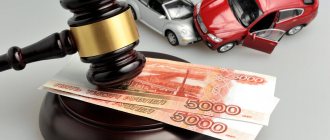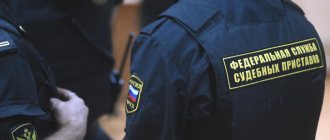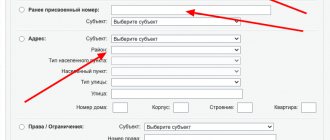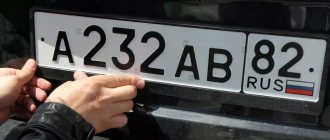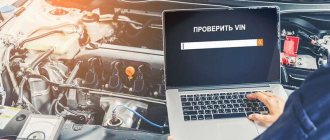Seizure of property, for example, a car, which includes a ban on registration actions, is a measure to ensure the execution of a court decision by negligent debtors. For example, the debtor refuses to repay the debt - alimony, loans, taxes, fines.
But as soon as the bailiff begins to seal and confiscate his car, the money is immediately found.
Another situation also happens: the debtor understands that any day now a bailiff will come to his garage and take his “swallow” to be torn to pieces by evil creditors. And the creditors are his ex-wife and children. And then, with tears in his eyes, he decides to get rid of such property in order to leave his “bloody little ones” with their noses.
If you think that this topic concerns exclusively malicious non-payers of alimony and taxes and other scoundrels, then we will inform you - we have bad news for you.
As it was said in the classics of Soviet cinema: “Everyone who doesn’t have a car dreams of buying one, and everyone who has a car dreams of selling it. And he doesn’t do this only because if you sell, you’ll be left without a car. Man, more than any other living creature, loves to create additional difficulties for himself.”
What prohibitions and restrictions may apply to vehicles?
It could be:
- prohibition or restrictions on registration activities;
- prohibition from undergoing technical inspection:
Such a punitive measure was often used several years ago, because car owners have to undergo maintenance much more often than register a car, which means that it was possible to force the debtor to pay the bills much faster. However, the ban on undergoing maintenance deprived the car owner of the right to purchase an MTPL policy. Car owners filed lawsuits en masse about the illegality of the actions of bailiffs and won the cases. This forced FSSP employees to practically abandon the use of this measure.
- ban on disposal.
The most common punitive measures today are a ban or restriction of state registration.
Is it possible to drive with a ban?
The legislative framework does not provide for restrictions on the use of a vehicle for personal purposes. This means that the car owner can:
- use the car without any interference;
- entrust the driving of a vehicle to third parties if they have a driver’s license and the third party is included in the MTPL policy;
- lease or sublease a car in order to obtain additional benefits;
- take out an MTPL or CASCO policy;
- undergo scheduled maintenance if necessary.
The only limitation in 2021 will be the impossibility of transferring ownership to another person with subsequent registration of the vehicle with the traffic police department.
Who can restrict or ban state registration and for what?
The list of authorities is presented in the Order of the Ministry of Internal Affairs “On the procedure for registering vehicles” (N1001 dated November 24, 2008). Among other things, it says that a ban or restriction may be imposed:
- by a court order (for non-payment of taxes, late payment of traffic police fines, debts to utility or credit organizations, as well as during the division of property);
- investigative authorities (if the car is wanted);
- Traffic police (if external discrepancies are detected in the car with the characteristics specified in the technical passport);
- social protection authorities;
- customs representatives (in case of violations of import rules or indication of false information about the vehicle);
- other bodies vested with the necessary powers.
Reasons for car seizure?
Let's look at the most common reasons why property may be seized and why restrictions may be placed on it.
- If the owner of the car owes more than 3,000 rubles in enforcement proceedings;
- The presence in court of a civil case regarding the division of jointly acquired property of the spouses, which is a car. Or cases under a loan agreement, where the collateral is a car;
- Consideration by an arbitration court of a bankruptcy case of a potential seller;
- Initiation of a criminal case by law enforcement agencies, in which the vehicle was seized.
What are the risks of buying a car with restrictions?
A car with a court ban on registration actions will not be able to go through the registration procedure with the traffic police. The new owner has ten days from the date of purchase of the car to do this. Otherwise, according to Article 19.22 of the Code of Administrative Offenses of the Russian Federation, the owner faces a fine of one and a half to two thousand rubles.
Driving an unregistered car threatens the owner with a fine of 500 to 800 rubles. If you are stopped again, the amount of the penalty will increase to 5 thousand rubles. The car owner also faces deprivation of his license for a period of one to three months.
The car is banned - what should I do if I don’t intend to sell it?
As you already understand, restrictions are relevant when performing various types of registration actions. Therefore, if you are not going to alienate or purchase a car, then it would seem that you should not worry about this. But that was not the case.
The first catch is that a ban on registration of a car can sooner or later develop into an arrest if the reason for the restriction is not eliminated - failure to pay the debt to the bailiffs. And already upon arrest, the bailiffs can seize the car: either by coming to your home, or right on the road during one of the raids together with the traffic police. But this is often only possible with large amounts of debt, commensurate with the cost of the car itself.
Expert opinion
Dmitry Tikovenko
Automotive law expert. 7 years of experience. Areas of specialization: civil law, disputes over compulsory motor liability insurance and road accidents
Currently, bans on registry activities are in most cases initiated by the state. Not directly, of course, but through employees of the traffic police, the Federal Tax Service and other departments.
This is due to an acute shortage of funds in the budget, which needs to be replenished through fines and taxes. It is for failure to comply with the above payments that a ban is most often imposed. The important thing is that to prohibit registration under these articles, the amount of debt is not important. Therefore, you can be refused registration of a car for a fine of 500 rubles.
But, of course, no one will seize the car for such a fine, the amount is insufficient, but if you accumulate debts in an amount approximately equal to the cost of the car, then it will definitely be taken away at the first opportunity.
Ask a Question
The second subtlety is that if you lose your registration certificate (the pink plastic card, which many motorists mistakenly call a “registration certificate”) and/or PTS, you will not be able to restore these documents. Because restoring them is a registration action that is prohibited for you. And, if in the case of a vehicle passport you can still drive a car, then if you lose the STS, driving is prohibited.
There is one loophole
It only concerns how to avoid the seizure of a prohibited car. And it lies in the flaw in the system of case management by bailiffs - information for bailiffs and traffic police officers on the road about an arrest is available only within their region. For example, if you are registered in Moscow, but get caught in Rostov or Yekaterinburg, then the bailiffs of the latter cities will not see the arrest, and if they do, they can only transmit information about your location - they cannot directly seize the property.
Thus, it is better to drive a car with restrictions not in the region where you are registered as the owner of the car.
How to remove restrictions on a car
In a situation where an unscrupulous owner did not inform you about the existing ban before purchasing, experts advise finding out what caused the punitive sanctions and which government agency initiated their imposition. A photocopy of the resolution must be issued to the MREO.
Then everything depends on the date indicated in the document. If you purchased a car before the foreclosure was imposed on the previous owner, you must write an application to the FSPP with a request to remove the restriction and submit papers that will serve as confirmation of your ownership rights (DCP). In many cases, this is enough to lift the ban. True, no one can guarantee that this will happen right away. You can hear many stories from unlucky customers with both happy and sad endings: for some it takes a day to lift restrictions, for others it takes months or even years. In any case, if representatives of the FSSP ignore your requests, contact the court for help.
If the DCP (purchase and sale agreement) has not been drawn up, you can:
- pay off the debt yourself (it’s good if we are talking about two or three thousand rubles, but what if about tens or even hundreds of thousands?);
- try to find the former owner of the car and demand that he pay off the debts that caused the ban or restrictions - this option is more of a fantasy, since finding the previous owner, especially if he does not want it or the car was bought in another region of the country, can be very difficult (and It’s not a fact that he will agree to pay the bills).
Remember that in order to cancel the restrictions, you must present the bailiff with papers confirming payment of the debt. After this, he must give you a document on lifting the ban, with which you need to go to the traffic police. The bailiff is also required to send a similar document there, but sometimes such sending takes quite a long time.
There are situations when the best solution is to file a claim to terminate the contract and return the amount paid to the seller. For example, in a situation if it turns out that a restriction has been imposed on the car due to its being in collateral. The basis for applying to the judicial authorities will be Article 450 of the Civil Code of the Russian Federation, which provides for the possibility of terminating the contract if one of the parties seriously violates the rules of the contract.
When is a ban on vehicle registration imposed?
In order to make a decision to ban the registration of a car, government services must have a compelling reason. For each structure there is a specific list:
- Customs authorities make this decision in 2021 as a result of an incorrectly completed customs clearance procedure, provision of inaccurate data, or suspicion of fraudulent actions on the part of the owner.
- Investigative authorities impose a ban on registering a car if the car is involved in a criminal case of theft.
- The traffic police may also impose a ban, the basis for which will be the participation of the car in an accident. At the same time, the vehicle must have damaged elements with the VIN code printed on them (nameplates and plates), which prevents identification of the vehicle.
- The social service is authorized to make such a decision if the interests of minors are affected in relation to the division of property.
- Judicial authorities. In this case, the reason may be a dispute over the division of property or the right of inheritance. The court also imposes a ban in a situation where the security for the claim is represented by a vehicle. For bailiffs, the basis is existing debt for housing and communal services, accumulated fines, etc.
The owner of the car can clarify the reason that led to the decision to ban registration without any problems. The traffic police must clarify which government service has imposed the restriction. And then seek clarification and clarification of the reasons.
Nuances
It is important to understand that even if the previous owner does not live at the place of registration and does not contact the new owner of the car, the issue can be resolved in court. Having prepared a package of documents and filled out an application, the new owner files a statement of claim. During the trial, there is a high probability that the seizure of the vehicle will be lifted and restrictions will be imposed on other property of the debtor. The assistance of a qualified lawyer with experience in handling similar cases will be a good help in resolving the issue in your favor.
Free legal consultation
Don’t put off solving your problem for later - call us right now: +7(351)215-97-00 Ask a question
online or write on social networks
32 comments on “Car Ban? What to do?""
- Yuri
:
11/12/2019 at 20:58
Good afternoon. Please tell me. I have been looking for a car on the secondary market for my own use for a long time. I have a small amount, about 400 thousand rubles. I checked all the ads on well-known portals for selling used cars. I received a call from a well-known company located in your city and offered to buy a car at 2 times lower than the market price. I almost bought a ticket and didn’t go to the city of Chelyabinsk. Over the phone I was told that there was a ban on registration on the car, established by the bailiff. They said that after the purchase the issue would be resolved 100% within two weeks. Everything will supposedly be officially written down in the contract. Should the company be trusted and are there legal guarantees that the ban will be lifted?
Answer
- Ivan Alexandrovich
:
11/12/2019 at 20:59
Hello. I have to disappoint you. Most likely they want to deceive you by offering a good price. When registering with the traffic police, you will not be able to register your car, and you will not be able to drive for a long time without state registration. After the specified time has passed, you may be subject to administrative liability. In addition, bailiffs may foreclose on the car, which means it will be confiscated. We do not recommend a car with a ban on purchase.
Answer
- Sergey
:
11/19/2019 at 07:18 pm
Good afternoon. The bailiffs seized my car, which seems illegal to me. Where to turn, they are creating real chaos, I don’t know what to do. In general, I bought the property, but did not manage to register it on time within 10 days; a month later I found out that the bailiffs had imposed a ban on registration actions. I saw it in the traffic police database. I flew to them, they told me we don’t know anything, the car is listed as the debtor’s. I showed the purchase and sale agreement, they didn’t even listen, they said go to court and prove it. I brought the claim to court, they said it was filed incorrectly, and they returned it. Where to look for the truth? Help me please, thanks in advance!
Answer
- Ivan Alexandrovich
:
11/19/2019 at 19:20
Good day. Indeed, it may seem that the debtor in enforcement proceedings is trying to save property from seizure. Go to court, involve the former owner as a third party. Prove that the deal is not sham.
Answer
- Konstantin
:
11/23/2019 at 12:14 pm
Tell me, I want to buy a car, but I’m afraid because the amount is not small. I have relatives who want to sell their car, but it is pledged to the bank. The loan balance is about 300 thousand rubles. I'm afraid that if my relatives stop paying for the loan, the bank will take the car. How can I insure myself and not end up in the red? You understand that today the relationship is good, but tomorrow it can easily deteriorate. I will bear all costs of re-registration. There is an acquaintance at the traffic police who said that I have nothing to fear, supposedly to be legally insured. What is the best way to deal with this situation?
Answer
- Ivan Alexandrovich
:
11/23/2019 at 12:16 pm
Good afternoon. The correct option would be to draw up a purchase and sale agreement. If the loan balance does not exceed the cost of the car, then it is better to close the balance immediately. In the agreement, indicate the bank account for the loan. It would be a good idea to obtain the mortgagee's consent to the sale.
Answer
Dmitriy
:
21.11.2020 at 17:09
I have owned the car for 1 year and 4 months. The Arbitration Court judge imposed a ban on the reg. actions due to the bankruptcy of 1 more owner. I am already the 4th owner and bought a car without a ban and re-registered it in my name.
Answer
Ilisheva Elvira
:
03/04/2021 at 10:58
Dmitry, hello! You need to ask some clarifying questions. We'll help you keep your car with you. Call 8/351/215-97-00.
Answer
- Alina
:
02/26/2020 at 12:14
Hello. An accident occurred through my fault, the victim filed a lawsuit asking for damages of 550,000 rubles and filed a claim to seize my car. The court upheld the claim and imposed a ban on the registration of the car. What will happen now? Will they take the car?
Answer
- Ilisheva Elvira
:
03/11/2021 at 14:42
Alina, hello, yes, they will take it to pay off the debt.
Answer
- Anatoly
:
05/27/2020 at 02:18
28 08 19 The court issued a ruling to seize the car. The trial itself took place on December 18, 2021. But it was appealed. On May 25, an appeal court was held, where a decision was made to change the amount of payment to the plaintiff for the car during the division of property on the basis of the car valuation report I provided. What should I do if, in order to comply with court decisions, I need to sell the car, since there are no other means to pay off the debt, and the car is under arrest. I myself am a pensioner. Banks don't give me loans. Borrowing 460 thousand is unrealistic.
Answer
- Ilisheva Elvira
:
03/05/2021 at 10:50
Anatoly, hello! The seizure of the vehicle will not be lifted until you comply with the court decision. There is only one way out - find money, pay off the debt, sell the vehicle, return the money.
Answer
- Ilya
:
08/19/2020 at 14:53
I have been the owner of the car for 2.5 years. Now I decided to sell and it turned out that the bailiffs had imposed restrictions on the former owner due to a debt of 4 thousand rubles. I sent a letter to the bailiffs in the Krasnodar region with a copy of the purchase and sale agreement and the vehicle title, which can be seen from it. that the car was sold in 2015, and the decree banning registration actions in 2021. There is no result.
Answer
- Ilisheva Elvira
:
03/04/2021 at 11:32
Ilya, hello! Write a complaint to the Main Directorate of the FSSP of the Krasnodar Territory, they will immediately remove it. Response time is 10 days.
Answer
- Lyudmila
:
05.10.2020 at 20:12
Good time. There is a court decision in which the seizure of the car was canceled. But in the traffic police database the arrest has not been lifted. Where to go? And further. The owner of the car changed his place of residence.
Answer
- Ilisheva Elvira
:
03/04/2021 at 09:36
Lyudmila, hello! Here it is important to know whether enforcement proceedings were initiated in the FSSP. If yes, then you must contact the FSSP to lift the ban. If not, then to the traffic police.
Answer
- Natalia
:
10/14/2020 at 12:16
Good afternoon. Tell me, my vehicle was driven by a third party while intoxicated. His unpaid fine of 30 tr is in the fines database of my car. If the bailiffs fail to pay the fine, the bailiffs may seize my property and vehicle. Thank you
Answer
- Ilisheva Elvira
:
03/04/2021 at 09:19
Natalya, hello! You need to contact the traffic police with a statement about the loss of control over the vehicle, attaching a purchase and sale agreement. Remove her from the register. The bailiff will not understand the truth. We will help. Call.
Answer
- Sergey
:
01/12/2021 at 09:55
After the divorce, during the division of property, the car registration was seized. The car was sold before the division under a written purchase and sale agreement, but was not re-registered to the new owner. The court decided the new owner's right of possession (there is a copy of the court decision). Where or who should I contact to get the arrest lifted?
Answer
- Ilisheva Elvira
:
03/02/2021 at 10:58
Sergey, hello! You need to contact the bailiff service with a court order and a vehicle purchase and sale agreement. SPI is obliged to lift the ban on registration actions with the mark - the owner is a third party.
Answer
- Elena
:
03/24/2021 at 17:04
Good afternoon please tell me, the court has imposed a ban on registration of the car. Enforcement proceedings were initiated by bailiffs, which were completed and the restrictions were lifted. But in the traffic police database there is a ban. Where should I go? To the court and how soon the court will lift the restrictions
Answer
- Ilisheva Elvira
:
04/05/2021 at 09:02
Elena, hello! First, go to the FSSP and find out whether the electronic ban has been lifted at all. And resolve this issue not with the bailiff, but with the deputy chief. There is no point in going to court. There is a technical error in the FSSP database.
Answer
- Victoria
:
08/11/2021 at 17:16
Hello, I bought a car and registered it. A month later, a court decision imposed a ban on the registration. Actions. After the Proceedings, we found out that the car had been pledged to the bank since 2018. I am the third owner. The man who owned the car and pawned it died. Now I can't do anything with the car. Are there any chances of winning the case? The trial took place without my participation; I found out about the arrest by chance because I had lost my STS and filed for reinstatement. The court made a decision on the restriction and seizure when I was the owner of the car.
Answer
- Ilisheva Elvira
:
08/16/2021 at 08:05
Victoria, hello! Before buying a car, you need to check whether the vehicle is in the collateral register! Question: who sold you the car, the owner who died? For information, relatives of the deceased owner need to contact the insurance company in connection with the death of the owner so that the insurance company will pay the balance of the loan. Has the court made a decision against you? Call: 8/351/215-97-00.
Answer
- Paul
:
08/16/2021 at 16:20
Good afternoon, there is a court decision banning the sale of the car. Can you move around on it? What about traveling outside the Russian Federation? how to find out what the court ban is for: not being able to sell or dispose of?
Answer
- Ilisheva Elvira
:
09/03/2021 at 12:54
Hello Pavel! You can travel by car, traveling abroad is also possible by car, but the question is: do you personally, Pavel, have any restrictions on traveling outside the Russian Federation? Who has imposed the ban can be found on the traffic police website by entering the VIN code of the car. And the ban on registration actions includes both sale and disposal.
Answer
- Sveta
:
09/26/2021 at 08:10
Good afternoon, I bought a car, got insurance, paid the state duty, passed the technical inspection and bam, a ban on registration and of course the previous owner doesn’t get in touch, the ban was issued by the court, the debt is on the loan, the car is not pledged to the bank, is there a chance win the case so that they are recognized as a bona fide purchaser, and the decision came into force on the 10th, and on the 11th we bought it
Answer
- Ilisheva Elvira
:
10/07/2021 at 15:37
Hello Svetlana! You need to prove in court that you are a bona fide buyer. There are chances.
Answer
- Nikolai
:
10/04/2021 at 11:30
Good afternoon, according to a court decision (during the division of property), a registration restriction was imposed on my car. Today I have in my hands a ruling from the same court to remove restrictions from my car, where should I go next, the FSSP employee who imposed the restrictions quit
Answer
- Ilisheva Elvira
:
10/07/2021 at 15:07
Nikolay, hello! You need to contact the MREO.
Answer
- Nikolai
:
10/07/2021 at 10:44
Good afternoon, in 2013, during divorce proceedings, the court imposed an arrest in the form of restrictions on the registry. actions on my car, after the end of the divorce proceedings for the division of property and my provision of evidence of payment of all obligations, the same court issued a ruling which refers to the removal of interim measures in the form of the seizure of my car, however, when selling this car in 2021, the traffic police told me that the car was seized in the form of restrictions on registration. actions, going to the bailiffs did not give anything, because... the restrictions were imposed by a judicial authority and this car is not listed in the FSSP database, what should I do? I have a court ruling on lifting restrictions in my hands.
Answer
- Ilisheva Elvira
:
10/07/2021 at 14:54
Nikolay, hello! You need to obtain a ruling on the lifting of restrictive measures and take away the traffic police MREO. Bailiffs do not see court prohibitions.
Answer
Add a comment Cancel reply
In case of seizure of a car
For the FSSP service, Article 64 provides the right to seize the debtor’s property, that is, a car, to enforce the penalty.
Only in this case you will no longer be able to drive a car. This is determined by the above law, namely Article 80.
If an arrest is made, the following measures are taken:
- A ban on driving a car is what makes it possible to ban driving a car.
- As an exceptional measure, the car may be taken away. But this is done only by court decision, or to sell the car to pay off fines. But this measure is rarely used.
Be aware that an arrest is made if the amount of debt is more than 3 thousand rubles. If the amount is less, the arrest will be a violation of the law, and you can drive the car.
What is needed to lift the ban
Experts recommend paying off debts and obligations as soon as possible. If the sanction is imposed as a result of outstanding fines, then the amount of debt will gradually increase. As a result, bailiffs confiscate movable property.
In some situations, the car owner’s rights are limited and a ban is imposed on performing registration actions with the car. The sooner he finds out what the reason is and what authority has seized it, the faster he will fix the problem and carry out any transactions with his car legally.
Ways to check restrictions
The easiest and most effective way to check a vehicle for a ban on car registration is an online request. Experts recommend using:
- Free traffic police service.
- Paid services through which you can obtain extended information about a given vehicle. For example, Autocode.
Note:
If a potential buyer decides to use a paid resource for checking the ban on vehicle registration, then he should be careful. The test result will not always reflect the real state of affairs. And only the traffic police database is an official source that is more trustworthy.



